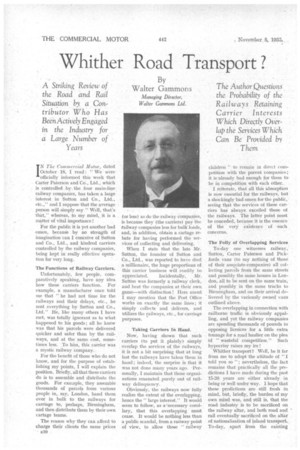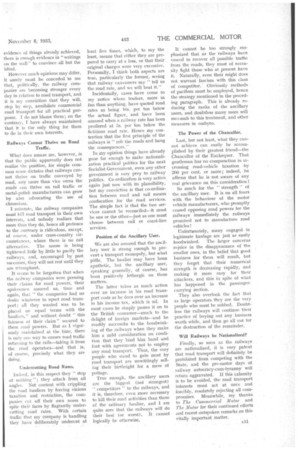Whither Road Transport ?
Page 132

Page 133

If you've noticed an error in this article please click here to report it so we can fix it.
By Walter Gammons
IN The Commercial Motor, dated October 18, I read: " We ' Were officially informed this week that Carter Paterson and-Co., Ltd., which is controlled by the four main-line' railway companies, has taken a large interest in Sutton and Co., Ltd., etc.," and I suppose that the average person will simply say " Well, that's that," whereas, to my Mind, it is a matter of vital importance !
For the public it is yet another bad omen, because by no strength of imagination Can I conceive of Sutton and Co., Ltd., and kindred carriers controlled by the railway companies, being kept in really effective operation for very long.
The Functions of Railway Carriers.
Unfortunately, few people, comparatively speaking, have any idea how these carriers function. For example, a manufacturer once told me that " he had not time for the railways and their delays, etc., he sent .everything by Sutton and Co., Ltd." He, like many others I have met, was totally ignorant as to what happened to his goods ; all he knew was that his parcels were delivered quicker and safer than by the railways, and at the same cost, sometimes less. To him, this carrier was a mystic railway company.
For the benefit of those who do not know, and for the purpose of establishing my points, I will explain the position. Briefly, all that these carriers do is to assemble and distribute the goods. For example, they assemble thousands of parcels from various people in, say, London, hand them over in bulk to the railways for carriage to, perhaps, Birmingham, and then distribute them by their own cartage teams.
The reason why they can afford to charge their clients the same prices El0 (or less) as do the railway Companies, is betause they' (the carriers) pay the railway companies less for bulk loads, and, in addition, Obtain a cartage rebate for having performed the services of collecting and delivering.
When I state that the late. Mr. Sutton, the founder of Sutton and Co., Ltd., Was reported to have died a millionaire, the huge proportions of this carrier business will readily be appreciated. Incidentally, Mr. Sutton was formerly a railway clerk, and beat the companies. at their own game—with distinction ! Here anent I may mention that the Post Office works on exactly the same hues; it simply collects and delivers, and utilizes the railways, etc., for carriage purposes.
Taking Carriers In Hand.
Now, having shown that such carriers (to put it plainly) simply ov,erlap the services of the railways, it is not a bit surprising that at long last the railways have taken them in hand ; indeed, the surprise is that it was not done many years ago. Personally, I maintain that those organizations emanated purely out of railway delinquency.
Obviously, the railways now fully realize the extent of the overlapping, hence the " large interest." It would seem to follow, as anecessary corollary, that this overlapping must cease. It would he nothing less than a public scandal, from a railway point of view, to allow these "railway children " to remain in direct competition with the parent companies ;• it is 'already bad enough for them to be in competition with each other.
I reiterate, that all this absorption is now essential for the railways; but a shockingly, bad omen for the public, seeing that theservices of these carriers has always excelled those of the railways. The latter point must be conceded, because it is the essence of the very existence of such concerns.
The Folly of Overlapping Services To-day one witnesses railway, Sutton, Carter Paterson and Pickfords vans (to say nothing of those of their associate-companies) all collecting parcels from the same streets and possibly the same houses in London, all to be sent on the same train, and possibly in the same trucks to Birmingham, and on their arrival delivered by the variously owned vans outlined above.
The overlapping in connection with railborne traffic is obviously appalling, and yet the railway companies are spending thousands of pounds in opposing licences for a little extra tonnage for a road haulier on the plea of " wasteful competition." Such hypocrisy raises my ire !
Whither transport? Well, be it far from me to adopt the attitude of " told you so " ; nevertheless, the fact remains that practically all the predictions I have made during the past 15-20 years are either already in being or well under way. I hope that these predictions are still fresh in mind, but, briefly, the burden of my own mind was, and still is, that the road industry is to be sacrificed on the railway altar, and both road and rail eventually sacrificed on the altar of-nationalization of inland transport.. To-day, apart from the existing
evidence of things already achieved, there is enough evidence in "writings on the wall" to convince all but the blind.
However much Opinions may differ, it surely must be conceded to me that, politically, the railway companies are becoming stronger every day in relation to road transport, and it is my conviction, that they will, step by step, annihilate commercial road transport for all practical purposes. I do not blame them ; on the contrary, I have always maintained that it is the only thing for them to do in their own interests.
Railways Cannot Thrive on Road Traffic.
What does amaze me, however, .is that the public apparently does not realize the position, for simple common sense dictates that railways cannot thrive on traffic conveyed by road, any more than vice versa the roads can thrive on rail traffic or metal-polish manufacturers can grow by also advocating the use of chromi um.
reiterate, the railway companies must kill road transport in their own interests, and nobody realizes that more than they do, hence all pretence to the contrary is ridiculous, except, of course, under cross-country circumstances, where there is no rail alternative. The noose is being tightened little by little to pacify the railways, and, encouraged by past successes, they will not rest until they are triumphant.
It seems to be forgotten that when the railway companies were pressing their claims for road powers, their spokesmen assured us, time and again, that " the companies had no desire whatever to upset road transport ; all they wanted was to be placed on equal terms with the hauliers," and without doubt " this fairness of their claim" secured to them road powers. But as I vigorously niaintained at the time, there is 'only one way to ensure road traffic returning to the rails—taking it from the road operators—and that is, of course, precisely what they are doing.
Undercutting Road Rates.
Indeed, in this respect they " stop at nothing 7 ; they attack from all angles. Not content with crippling the road hauliers by forcing vicious taxation and restriction, the companies cut off their own noses to spite their faces by flagrantly undercutting road rates. With certain traffic that my company is handling they have deliberately undercut at
least five times, which, to say the least, means that either they are pre pared to carry at a loss, or that their original charges were very excessive. Personally, I think both aspects are true, particularly the former, seeing that railway canvassers say " tell us the road rate, and we will beat it."
Incidentally, cases have come to my notice where traders, more in fun than anything, have quoted road rates as being 10s. per ton below the actual figure, and have been amazed when a railway rate has been proffered at 3s. per ton below the fictitious road rate. Hence my contention that the first principle of the railways is "rob the roads and hang the consequences."
In my opinion things have already gone far enough to make nationalization practical politics for the next Socialist Government, even any other government is easy prey to railway politics. Co-ordination is very active again just now with its plausibility, but my conviction is that co-ordination between road and rail means confiscation for the road services. The simple fact is that the two services cannot be reconciled—it must be one or the other—just as one must choose between rail or coast-line services.
Position of the Ancillary User.
We are also assured that the ancillary user is strong enough to prevent a transport monopoly, but what piffie. The haulier may have been apathetic, but the ancillary user, speaking generally, of course, has been positively lethargic on these matters.
The latter takes as much action over an increase in his road transport costs as he does over an increase in his income tax, which is nil. In most cases he simply passes it on to the British consumer—much to the delight of foreign markets—and he readily succumbs to the hoodwinking of the railways when they make him a mild consideration on condition that they bind him hand and foot with agreements not to employ any road transport. Thus, the very people who stand to gain most by road transport are unwittingly selling their birthright for a mess of pottage.
True enough, the ancillary users are the biggest (not strongest)
competitors " to the railways, and it is, therefore, even more necessary to kill their road activities than those of the 'ordinary haulier, and I am quite sure that the railways will do their best' (or worst). It cannot logically be otherwise. It cannot be too strongly emphasized that as the railways have vowed to recover all possible traffic from the roads, they must of necessityfight those who at present have it. Naturally, even their might does not warrant fascism with this class of competitor.. Obviously methods of pacifism must be employed, hence the strategy mentioned in the preceding paragraph. This is already reducing the ranks of the ancillary users, and doubtless many more will succumb to this treatment, and other measures in embyro.
The Power of the Chancellor.
Last, but not least, what they cannot achieve can easily be accomplished by their greatest friend—the Chancellor of the Exchequer. That gentleman has no compunction in increasing road-vehicle taxation by 200per cent, or more; indeed, he affirms that he is not aware of any real grievance on this consideration I
So much for the " strength " of the ancillary user, It is on all fours with the behaviour of the motor vehicle manufacturers, who promptly ceased opposing roa4 powers for the railways immediately the railways promised not to manufacture road vehicles Unforbanately, many engaged in legitimate haulage are just as easily hoodwinked. The larger concerns rejoice in the disappearance of the smaller ones, in the belief that good business for them will result, but they forget that their numerical strength is decreasing rapidly, and making it more easy for their attackers, and this in spite of what has happened in the passengercarrying section.
They also overlook the fact that as large operators they are the very people who must be robbed. Doubtless the railways will continue their practice of buying out any business worth while, and then go all out for the destruction of the remainder.
Will Railways be Nationalized?
Finally, so soon as the railways are nationalized, it is very patent that road transport will definitely be prohibited from competing with the State, and the pre-motor days of milway autocracy-cum-tyranny will return aggravated. If this calamity is to be avoided, the road transport interests must act at once and forcibly, resolutely rejecting all compromises. Meanwhile, my thanks to The Commercial Motor and The Motor for their continued efforts and recent outspoken remarks on this vitally important matter.












































































































































































































































































































